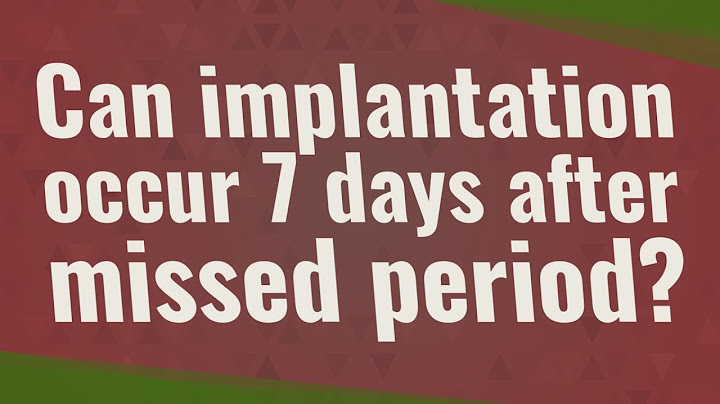Most women have their periods regularly every 28 days, but others experience missed or late periods at least severally in a year without being pregnant. This is perfectly normal, so you shouldn’t be alarmed when it happens to you. Show
For many, late periods usually trigger pregnancy thoughts, but it doesn’t always mean you are pregnant. This post will be shedding some light on this topic, so read on know more.  How many days late should a period be before you worry about pregnancy?Generally, menstrual cycles vary from one person to another; provided one is healthy, the cycle will range from 21 to 35 days. So unless you experience irregular cycles because of a medical condition, you likely know when to expect your next menstruation. You can say your period is late if it doesn’t start within the seven days of when it’s expected. Many early pregnancy tests available in Australia can provide accurate results by this time, determining whether you are pregnant or not. If the pregnancy test results turn out negative after a late period, you should consider seeing your healthcare provider right away to know what’s going on. If the pregnancy test result is negative and you haven’t gotten your menstruation yet, but you are experiencing early pregnancy symptoms, try taking another test. Sometimes at-home pregnancy test kits can offer negative results if the test is taken too early before the body produces enough hCG, which is detected in your urine. The earliest and most reliable hCG detection can be done using an hCG serum test performed eight to10 days after ovulation by a doctor. Buy pregnancy tests in Australia with fast delivery, accurate results, and early detection of pregnancy How can you tell your period is late?When you have a lot on your mind or are busy, it is easy to forget the next time your period should start. So if you are not sure when to expect the next period, knowing whether it’s late will not be easy. Luckily, you can track your period using tracking apps. All you have to do is log in your menstrual cycle dates, and the application will predict when to expect the next period. The information presented by these applications will come in handy if you decide to consult your health care provider after experiencing a late period. Having this menstrual cycle information will also assist them to understand what is happening in your body. An Australian study of the most downloaded fertility apps found that over half didn’t predict ovulation and menstrual cycle dates.  9 Reasons why you may have a late period (other than pregnancy)A late period that isn’t caused by pregnancy can occur due to a number of reasons. Some prevalent causes are outlined below: Hormonal birth controlOne way hormonal birth control prevents conceiving is by thinning a uterine lining. The endometrium lining is where an embryo gets to implant itself once an egg is fertilized, making one pregnant. This layer also sheds from the uterus if fertilization does not occur, as monthly periods. Because birth control makes the layer thinner, many women experience lighter periods. Sometimes the endometrium can get so thin that the monthly bleeding doesn’t happen. Generally, everyone is different, and as long as you are taking birth control correctly, you should not be concerned if you miss a period. If you would like to ease your mind, you can always take a pregnancy test to confirm if you got pregnant. Stress can cause a late periodStress affects women differently, but when you experience chronic stress, produced hormones like cortisol will interfere with the menstrual cycle. But it is not easy to determine how much stress you can take or need to experience to have such effects since everyone reacts differently. Nevertheless, stress can cause you to change your daily routine, lead to illness or sudden weight loss or gain, all of which will affect your menstrual cycle. If you think that stress is throwing off your period, be sure to make a few lifestyle changes as soon as possible. For instance, you can try practising relaxation techniques, adding exercise to your regimen, or any other healthy lifestyle habits you know to keep the body and mind in good shape. Weight fluctuationsBeing underweight or overweight (BMI calculator) can also lead to hormonal imbalances because fatty tissue plays a key role in synthesizing hormones. What’s more, losing or gaining a certain amount of weight within a short period may also affect your hypothalamus. Hypothalamus is an essential part of the body’s system that’s responsible for your hormones. Once the hypothalamus function is disrupted due to weight change, it will disrupt ovulation, causing a missed or late period. Medication & late periodsSome of the medications you might be required to take to treat certain conditions can cause irregular periods. For instance, antipsychotics create hormonal imbalances that lead to missed or late periods. Some birth controls, like implant, IUD, and shot, can affect your periods too. So if you start missing your periods and you’re taking some medication, be sure to check with your doctor or pharmacist to verify if you’re experiencing a side effect due to the treatment. Wondering if you are pregnant? Buy Australian early detection pregnancy tests for fast, accurate results!  Polycystic ovary syndrome (PCOS)PCOS is a condition that causes the body to produce loss of male hormone androgen, which leads to the formation of cysts on the ovaries because of the hormone imbalance problem. This can make you have irregular ovulation or stop it altogether. You will experience irregular periods and other symptoms such as:
Other hormones like insulin may also become imbalanced due to the insulin resistance associated with polycystic ovary syndrome. If you believe you have polycystic ovary syndrome, you should see your health care provider to get a proper diagnosis and treatment for the condition. PCOS treatment mainly focuses on relieving the symptoms you might be experiencing. The doctor may also prescribe birth control and other medication to enable you to regulate your menstrual cycle. Early perimenopauseMost women start menopause between the age of 45 and 55. Women who develop symptoms of menopause around the age of 40 or earlier are considered to have early perimenopause. This signifies that a woman’s egg supply is winding down, which results in missed periods and the eventual end of the menstrual cycle. Your healthcare provider can confirm if you’re experiencing late periods due to early perimenopause. BreastfeedingAfter delivery, your period might not make an appearance for some time. This is because you are breastfeeding your newborn, a phase that’s known as lactational amenorrhea. The phase disrupts the menstrual cycle rhythm, but your monthly periods should be back on track after a few months. Increased exerciseCreating time to exercise every day is good for your health, but excessive exercise can do more harm than good. For instance, it can reduce estrogen levels in your body, the hormone that regulates the reproductive process in every female. Most athletes tend to have secondary amenorrhea, which means they do not have periods for six months or longer due to rigorous training. So, if you are exercising excessively and experiencing a late period, you should switch to low-intensity workouts. Late period & Thyroid dysfunctionAn underactive or overactive thyroid gland can cause missed or late periods. The thyroid usually produces hormones that regulate specific body processes, so when it’s off-balance, you’re likely to miss your periods. Luckily, you can get effective treatments for thyroid disorders, so be sure to visit an endocrinologist to get a blood test done if you think you could be having thyroid issues. After treatment, your periods will probably return to normal, making it easier to conceive. A late period does not necessarily mean that you are pregnant. In some situations, your cycle could be affected by different factors, as those outlined above. But, if you are really worried about your late period and would like to know the underlying cause, it is always helpful to do a pregnancy test or get in touch with your health care provider. For accurate pregnancy results, check out our pregnancy tests in Australia today! |

Related Posts
Advertising
LATEST NEWS
Advertising
Populer
Advertising
About

Copyright © 2024 en.frojeostern Inc.


















